Prawdopodobnie już wiesz, że WordPress zasila ponad 43% wszystkich stron internetowych. To imponujące, ale nie jest to jedyny system zarządzania treścią (CMS) typu open-source. Istnieje kilka innych opcji wartych uwagi.
Kiedy po raz pierwszy zaczęliśmy tworzyć strony internetowe, dogłębnie analizowaliśmy inne popularne platformy, takie jak Joomla i Drupal. I chociaż zawsze preferowaliśmy używanie WordPressa do wszystkich naszych projektów, rozumiemy, że niektórzy z Was mogą szukać czegoś innego.
W tym artykule porównamy WordPress vs Joomla vs Drupal. Wyjaśnimy, co nam się podoba, a co nie, aby pomóc Ci zdecydować, który z nich może być najlepszym wyborem dla Twoich konkretnych potrzeb.
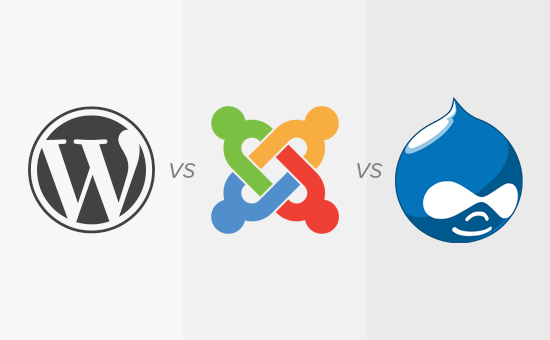
Uwaga: Porównujemy WordPress.org, a nie usługę hostingową WordPress.com. Zapoznaj się z naszym przewodnikiem na temat różnicy między WordPress.org a WordPress.com.
Co wspólnego mają WordPress, Joomla i Drupal
Wszystkie trzy najpopularniejsze systemy CMS w internecie mają wiele wspólnego pod względem technologii, filozofii i społeczności.
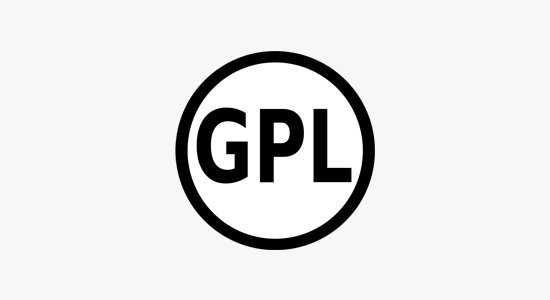
- WordPress, Joomla i Drupal to darmowe oprogramowanie typu open source, licencjonowane na mocy GPL. Zobacz nasz artykuł o tym, dlaczego WordPress jest darmowy, aby dowiedzieć się więcej o darmowym oprogramowaniu.
- Wszystkie trzy są napisane głównie w PHP.
- Wszystkie obsługują MySQL jako swój system zarządzania bazą danych. WordPress obsługuje wyłącznie MySQL, podczas gdy Joomla i Drupal obsługują inne systemy zarządzania bazą danych.
- Wszystkie trzy używają motywów i szablonów do wizualnego wyglądu stron, oraz wtyczek, modułów lub rozszerzeń do zwiększania funkcjonalności.
- Jako oprogramowanie open-source, są to projekty napędzane przez społeczność.
Chociaż istnieje wiele podobieństw, różnią się one pod wieloma względami.
Na przykład, mają różne polityki dotyczące tego, co włączyć do podstawowego oprogramowania, jak obsługiwać moduły i szablony, jak radzić sobie z bezpieczeństwem itp.
Te różnice mają duży wpływ na użytkowników i sposób, w jaki budują swoje strony internetowe.
Mając to na uwadze, przyjrzyjmy się, jak WordPress, Joomla i Drupal porównują się ze sobą, abyś mógł wybrać najlepszą platformę do tworzenia stron internetowych dla swojej firmy.
Łatwość użycia i przyjazność dla początkujących
Większość osób tworzących swoje strony internetowe nie jest deweloperami, projektantami ani programistami. Są to przeciętni użytkownicy, którzy po prostu chcą zbudować stronę internetową. Łatwość użycia jest najważniejszym czynnikiem dla większości użytkowników.
WordPress
WordPress oferuje słynną pięciominutową instalację. Większość hostingu WordPress oferuje również instalację WordPressa jednym kliknięciem. Dzięki temu nowy użytkownik może łatwo założyć bloga lub stronę internetową WordPress w ciągu kilku minut, a nie godzin.
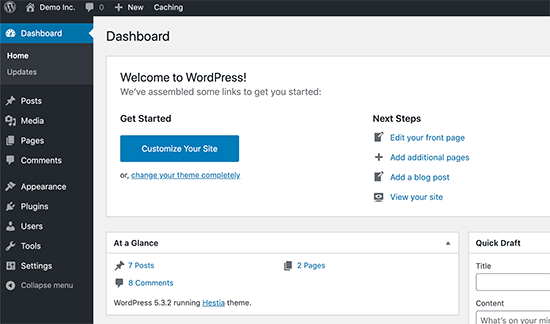
Doświadczenie użytkownika po instalacji WordPressa jest znacznie lepsze niż w Joomla czy Drupal. Użytkownik widzi proste, przejrzyste menu do tworzenia postów i stron lub rozpoczynania dostosowywania wyglądu i motywów.
Joomla
Instalacja Joomla może nie wyglądać na tak szybką jak WordPress, ale ma bardzo podobne kroki. Poza tym wielu dostawców hostingu współdzielonego oferuje również pakiety instalacji Joomla jednym kliknięciem.
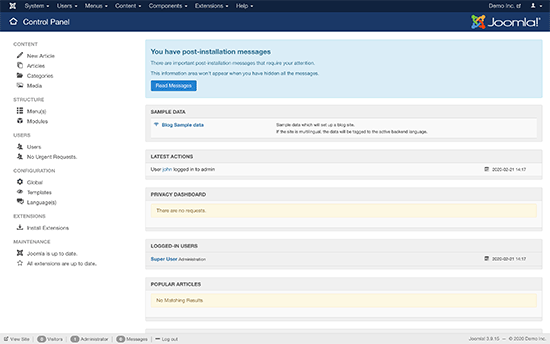
Po instalacji użytkownik trafia do panelu sterowania, który nie jest tak prosty jak w WordPress. Jest zbyt wiele menu do kliknięcia, aby dostosować stronę.
Fani Joomli powiedzieliby, że to dlatego, że Joomla jest znacznie potężniejsza niż WordPress, ale my w to nie wierzymy.
Drupal
Instalacja Drupala jest podobna do instalacji Joomli i WordPressa. Po prostu pobierz i prześlij pakiet, a następnie uruchom skrypt instalacyjny.
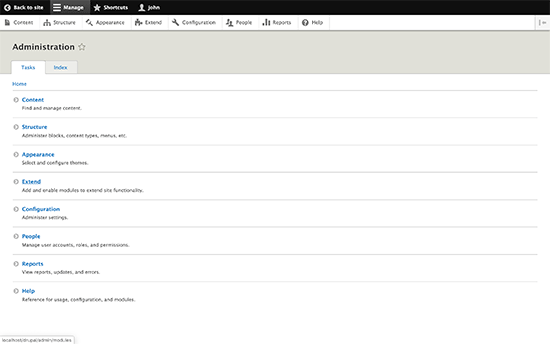
Drupal oferuje również dystrybucje. Są to gotowe pakiety Drupal z modułami i konfiguracjami do tworzenia określonych typów stron internetowych.
Doświadczenie po instalacji dla absolutnie początkujących jest nieco skomplikowane. Użytkownicy będą mieli trudności ze zrozumieniem, jak zmieniać rzeczy na swojej stronie. Drupal bardzo jasno pokazuje, jak dodawać treści, ale zmiana wyglądu i dodawanie elementów niebędących treścią nie jest oczywiste.
Zwycięzca: WordPress
Motywy i dodatki
Wszystkie te trzy popularne systemy CMS oferują motywy i wtyczki/moduły jako sposób na rozszerzenie funkcji i wyglądu oprogramowania.
Motywy kontrolują wygląd Twojej strony internetowej i to, jak wygląda ona dla Twoich użytkowników. Wtyczki lub Moduły są jak aplikacje dla Twojego CMS.
Zobaczmy, jak te trzy główne oprogramowania CMS radzą sobie w tej kategorii.
WordPress
WordPress pozwala użytkownikom zmieniać wygląd swojej strony za pomocą motywów. WordPress jest dostarczany z kilkoma preinstalowanymi domyślnymi motywami.
W dowolnym momencie możesz kliknąć przycisk dodaj nowy na swojej stronie Wygląd i zainstalować darmowe motywy WordPress z oficjalnego katalogu motywów WordPress.org.

Oprócz darmowych motywów, znajdziesz wiele więcej motywów premium WordPress opracowanych przez zewnętrzne sklepy z motywami, takie jak StudioPress, Elegant Themes i inne. Są to płatne motywy i oferują opcje wsparcia premium.
Prawdziwa moc WordPressa tkwi w wtyczkach. Dostępnych jest ponad 59 000 darmowych wtyczek WordPress w oficjalnym katalogu wtyczek WordPress. Możesz również kupić wtyczki premium, które oferują płatne wsparcie od twórców wtyczek. Sprawdź naszą listę niezbędnych wtyczek WordPress, aby zobaczyć, jak wtyczki sprawiają, że WordPress jest niesamowity.
Joomla
Podobnie jak WordPress, Joomla posiada szablony i rozszerzenia. Te świetne rozszerzenia mogą zrobić praktycznie wszystko, od tworzenia sklepu e-commerce po zarządzanie pocztą elektroniczną.
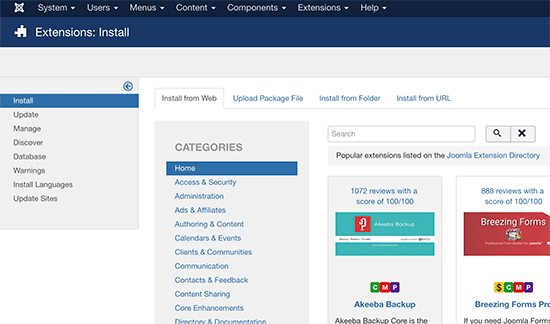
Jednak ilość tych szablonów i rozszerzeń nie jest tak duża jak w WordPress. Może to utrudnić znalezienie idealnego szablonu i idealnych rozszerzeń.
Domyślnie Joomla nie posiada funkcji, która pozwalałaby użytkownikom na wyszukiwanie i instalowanie rozszerzeń lub szablonów z obszaru administracyjnego. Istnieje rozszerzenie, które pozwala dodać funkcję „instaluj z sieci” dla rozszerzeń. Jednak w przypadku szablonów użytkownicy nadal będą musieli ręcznie wyszukiwać szablony, a następnie instalować je, dodając ich adres URL.
Drupal
Drupal ma ten sam problem z dostępnością motywów i modułów. Użytkownicy będą musieli opuścić swoją stronę, wyszukać moduł i motyw, który chcą dodać, a następnie zlokalizować adres URL pliku zip projektu. Na koniec mogą wprowadzić adres URL na stronie Moduły lub Motywy, aby je zainstalować.
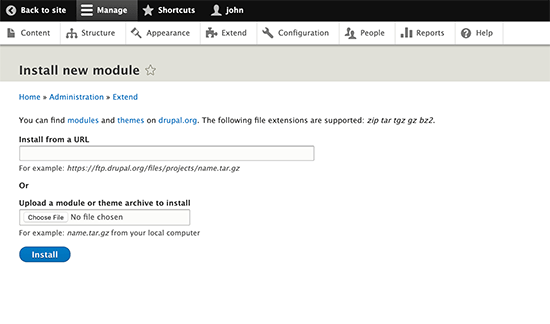
Istnieją moduły do robienia prawie wszystkiego, a nowe są regularnie dodawane. Mimo to, ogólna ilość modułów jest niewystarczająca w porównaniu do WordPress.
Zwycięzca: WordPress.
Opcje wsparcia
Dostępność opcji pomocy i wsparcia jest bardzo ważna dla początkujących użytkowników. Na pewno pojawią się pewne przeszkody, gdy będziesz korzystać z nowego oprogramowania. To jest w porządku, dopóki możesz uzyskać pomoc.
WordPress
WordPress ma silną społeczność użytkowników. Pomocy dotyczącej WordPressa można szukać na oficjalnych forach wsparcia, w dokumentacji, podręcznikach, kodeksach, kanałach Slack, Stack Exchange, grupie na Facebooku WPBeginner Engage i na prawie każdym forum internetowym dotyczącym projektowania i tworzenia stron internetowych.
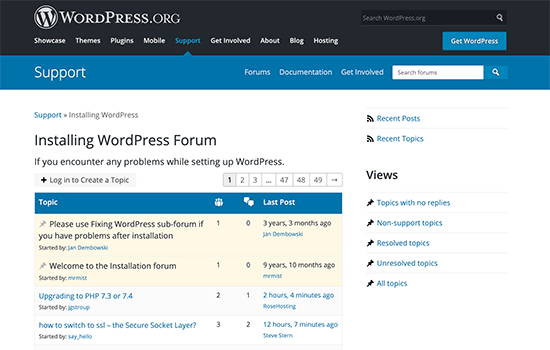
Istnieją strony takie jak WPBeginner, zawierające setki samouczków, samouczków wideo i artykułów skierowanych do początkujących użytkowników WordPress. Istnieje wiele sposobów na uzyskanie darmowego wsparcia dla WordPress.
Oprócz opcji bezpłatnego wsparcia, istnieją również sposoby na uzyskanie płatnego wsparcia dla WordPressa.
Platformy internetowe, takie jak Codeable, Upwork i Fiverr, to tylko niektóre z miejsc, w których można zatrudnić specjalistów od WordPressa, aby Ci pomogli.
Ze względu na ogromną popularność WordPressa, znalezienie programistów WordPress jest łatwe i niedrogie dla małych firm i osób prywatnych.
Joomla
Joomla, podobnie jak WordPress, ma dużą i bardzo pomocną społeczność. Strona Joomla zawiera obszerną dokumentację, która jest cennym zasobem dla początkujących. Aby uzyskać bardziej interaktywne wsparcie, użytkownicy mogą dołączyć do forów, list mailingowych, grup użytkowników itp.
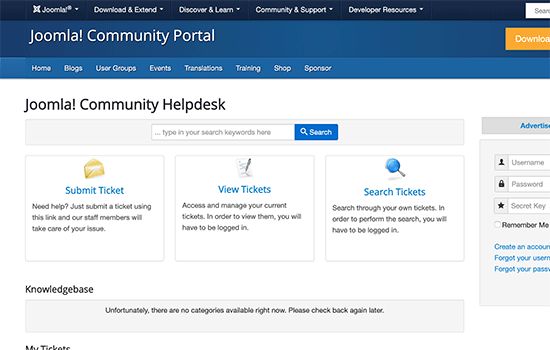
Oprócz wsparcia społeczności, istnieją zewnętrzne zasoby, płatne szkolenia i agencje deweloperskie, które mogą być pomocne.
W przeciwieństwie do WordPressa, znalezienie przystępnej cenowo pomocy eksperckiej dla Joomli jest dość trudne. Zatrudnienie programisty lub eksperta do tworzenia, rozwiązywania problemów lub pomocy technicznej w Joomla może kosztować znacznie więcej niż w przypadku WordPressa.
Drupal
Drupal ma bardzo aktywną społeczność fanów i użytkowników. Podobnie jak WordPress i Joomla, znajdziesz wszystkie opcje wsparcia społeczności dla Drupala. Istnieje obszerna dokumentacja, forum wsparcia, listy mailingowe, grupy użytkowników i czaty IRC – wszystkie są dobrymi miejscami, aby uzyskać porady i bezpłatną pomoc.
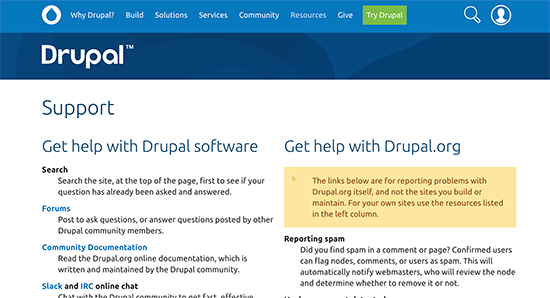
Drupal stara się połączyć użytkowników z deweloperami i firmami oferującymi profesjonalne usługi Drupal. Można ich znaleźć na Drupal Marketplace.
Jednak deweloperzy Drupal, podobnie jak Joomla, są bardzo drodzy w porównaniu do WordPressa.
Zwycięzca: WordPress
Lokalizacja i wsparcie wielojęzyczne
Duży procent stron internetowych tworzonych każdego dnia to strony nieanglojęzyczne lub wielojęzyczne. Jest znacznie bardziej prawdopodobne, że wielu początkujących będzie szukać systemu CMS, który może obsługiwać wiele języków lub ma wsparcie dla różnych lokalizacji i języków.
WordPress
WordPress doskonale nadaje się do tworzenia wielojęzycznych stron internetowych. Nie obsługuje wielu języków od razu po instalacji, ale istnieje kilka doskonałych wtyczek, które pozwalają łatwo tworzyć wielojęzyczne strony WordPress.
WordPress jest dostępny w ponad 57 językach. Nowe języki można zainstalować jednym kliknięciem z obszaru administracyjnego WordPress.
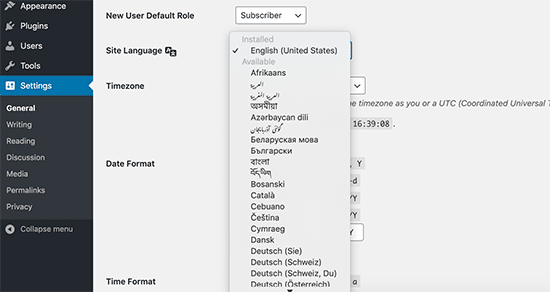
Najpopularniejsze motywy i wtyczki są również dostępne w wielu językach, a twórcy motywów i wtyczek aktywnie szukają pomocy w tłumaczeniu swoich pakietów na inne języki.
Wszystkie te wysiłki sprawiają, że WordPress jest świetną platformą do tworzenia stron internetowych w języku innym niż angielski lub wielojęzycznych.
Joomla
Joomla oferuje gotową do użycia funkcjonalność do obsługi wielojęzycznej strony internetowej bez instalowania żadnych rozszerzeń. Po prostu przejdź do menedżera języków, dodaj język treści i zacznij tworzyć wielojęzyczne treści na swojej stronie internetowej.
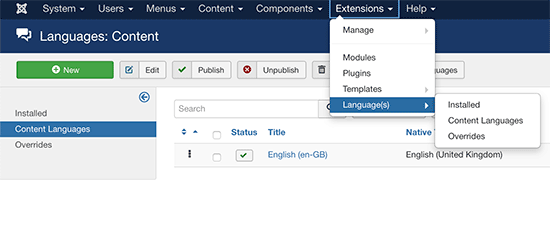
Tłumaczenia są również dostępne dla interfejsu administratora w wielu językach i można je łatwo zainstalować z obszaru administratora.
Drupal
Drupal posiada wbudowane wsparcie do obsługi stron w językach innych niż angielski lub wielojęzycznych. Będziesz musiał włączyć moduły locale i content translation. Następnie możesz dodać języki strony i interfejsu administracyjnego z sekcji konfiguracji Drupal.
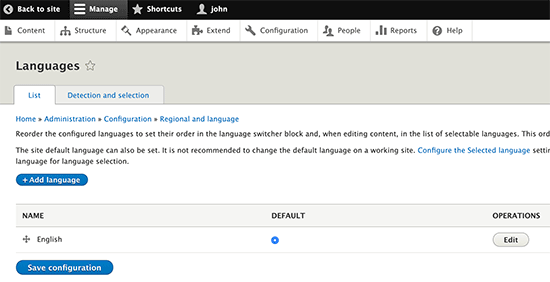
Zwycięzca: Remis – Wszystkie trzy obsługują strony wielojęzyczne i są dostępne w wielu językach.
Bezpieczeństwo
Bezpieczeństwo jest bardzo ważnym czynnikiem przy wyborze CMS-a dla Twojej strony internetowej. Prawie każda strona internetowa w Internecie jest narażona na zagrożenia bezpieczeństwa.
WordPress
Jako najpopularniejszy CMS na świecie, strony oparte na WordPressie są często celem hakerów. Jednak WordPress jest zbudowany na bardzo bezpiecznym kodzie i bardzo szybko reaguje na luki w zabezpieczeniach.
WordPress posiada również mechanizm automatycznych aktualizacji, który pozwala na automatyczne aktualizowanie stron WordPress po wydaniu nowej poprawki bezpieczeństwa.
Witryny WordPress można dodatkowo zabezpieczyć za pomocą automatycznych kopii zapasowych, uwierzytelniania dwuskładnikowego i innych najlepszych praktyk bezpieczeństwa WordPress.
Istnieje również wbudowany mechanizm do wyświetlania aktualizacji motywów i wtyczek WordPress. Pozwala to programistom motywów i wtyczek na szybkie reagowanie na wszelkie luki w zabezpieczeniach.
Joomla
Joomla jest bardzo podobna do WordPressa pod względem bezpieczeństwa. Aktywnie reagują na wszelkie luki w zabezpieczeniach i bardzo szybko je łatają. Jednak utrzymanie strony internetowej i instalowanie aktualizacji nadal spoczywa na użytkowniku.
Dostępne są rozszerzenia do tworzenia kopii zapasowych Twojej strony Joomla. Możesz również wzmocnić bezpieczeństwo swojej strony Joomla, stosując te same najlepsze praktyki, co w przypadku WordPress.
Drupal
Drupal podchodzi bardzo poważnie do kwestii bezpieczeństwa. Publikują luki w zabezpieczeniach na swojej własnej stronie, gdy tylko zostaną wykryte i załatane. Istnieje przekonanie, że Drupal jest bezpieczniejszy, ponieważ nie słyszy się o atakach na strony Drupal tak często, ale może to być spowodowane tym, że nie jest tak popularny jak Joomla czy WordPress.
Zwycięzca: Remis – Wszystkie trzy przestrzegają odpowiednich standardów bezpieczeństwa.
Wnioski:
Drupal, Joomla i WordPress to fantastyczne systemy zarządzania treścią. Drupal i Joomla mają znacznie więcej wbudowanych funkcji niż WordPress.
Jednak WordPress przewyższa je łatwością użycia, ogromną globalną społecznością, wtyczkami i motywami. Uważamy, że większość użytkowników niebędących programistami uzna tworzenie stron w WordPressie za znacznie łatwiejsze niż w Joomla czy Drupal.
Dzięki ponad 59 000 wtyczek WordPress możesz dodać praktycznie każdą funkcję lub zbudować dowolny typ strony internetowej, jaki chcesz (bez pisania kodu).
Zwycięzca Główny: WordPress
Jak zacząć z ulubionym CMS
Niezależnie od tego, czy wybierzesz WordPress, Joomla, czy Drupal, będziesz potrzebować nazwy domeny i hostingu strony internetowej, aby stworzyć witrynę.
Na szczęście wszystkie te trzy najlepsze oprogramowania CMS mają dość podobne wymagania, co oznacza, że wszystkie najlepsze firmy hostingowe je obsługują.
Zalecamy korzystanie z Bluehost lub SiteGround. Obie firmy należą do największych firm hostingowych na świecie i specjalizują się w hostingu stron internetowych WordPress, Joomla i Drupal.
Aby uzyskać więcej rekomendacji, zapoznaj się z naszym kompletnym przewodnikiem po hostingu dla początkujących.
Jeśli zaczynasz z WordPressem, zapoznaj się z naszym przewodnikiem dla początkujących na jak stworzyć stronę internetową z instrukcjami krok po kroku.
Mamy nadzieję, że ten artykuł pomógł Ci porównać WordPress vs Joomla vs Drupal, aby dowiedzieć się, który CMS jest najlepszy dla Twojej witryny. Możesz również zapoznać się z naszym porównaniem WordPress vs. Blogger lub naszą galerią popularnych stron używających WordPressa jako CMS.
Jeśli podobał Ci się ten artykuł, zasubskrybuj nasz kanał YouTube po samouczki wideo WordPress. Możesz nas również znaleźć na Twitterze i Facebooku.





mohadese esmaeeli
Oczywiście, nie mam zamiaru angażować się w żadną wojnę CMS-ów. Jednakże, bazując na moim doświadczeniu (pracowałem z Joomlą przez 3 lata), WordPress może zapewnić lepsze wyniki w każdej dziedzinie dla dużych stron internetowych. Zazwyczaj, i jest to udowodnione, ponad 60% stron internetowych na świecie korzysta z WordPressa, podczas gdy mniej niż 15% z Joomli. Ogólnie rzecz biorąc, WordPress ma dla siebie piękny świat. Oczywiście, przed wyborem systemu zarządzania treścią musimy wziąć pod uwagę charakter strony internetowej. Niemniej jednak, biorąc pod uwagę niesamowite postępy, jakie poczynił WordPress, oraz wtyczki opracowane przez główne światowe firmy, WordPress może być teraz używany do każdego rodzaju strony internetowej.
Jiří Vaněk
Przetestowałem wszystkie trzy systemy redakcyjne i z mojego doświadczenia wynika, że WordPress jest dobry, szczególnie dla początkujących, aby nauczyć się pracować ze stroną internetową i zrozumieć podstawowe zasady. WordPress wydaje mi się najbardziej wszechstronny i co najważniejsze, w przypadku problemu ma ogromną bazę użytkowników, którzy chętnie pomagają rozwiązać problem za darmo.
Priya Sinha
Dzięki za post, świetne informacje o tym, który z WordPress, Joomla czy Drupal jest lepszy… jest to naprawdę pomocne. Polecę to innym.
Wsparcie WPBeginner
Glad you found our comparison article helpful!
Admin
Tom Hardy
Świetne informacje! Z mojego doświadczenia wynika, że WordPress jest najłatwiejszym systemem zarządzania treścią, który jest wysoce konfigurowalny. Z drugiej strony, Drupal jest złożony, ale najlepiej nadaje się do tworzenia zaawansowanych stron internetowych; jest to również bardzo bezpieczny CMS. Joomla plasuje się pomiędzy tymi dwoma CMS-ami pod względem konfigurowalności, łatwości użycia i bezpieczeństwa.
Wsparcie WPBeginner
Thanks for sharing your opinion
Admin
Duane Hamann
Myślę, że ten artykuł ma rację. Dla niewykwalifikowanej osoby, która chce założyć przyzwoitą, zarządzaną stronę internetową, WordPress jest najlepszą opcją. Ale ma ograniczenia, które Joomla pokonała. Dla kogoś, kto ma doświadczenie w tworzeniu CMS, Joomla zajmuje #1 miejsce ze względu na swoją elastyczność w niestandardowych komponentach, jest znacznie bardziej techniczna, więc dla osoby szukającej czegoś przyzwoitego i łatwego do zrozumienia, WordPress wygrywa. To jednak nie rzuca światła na WordPressa w porównaniu do Joomli. Wszystko, co mówi, to to, że dla osób bez umiejętności tworzenia stron, WordPress jest najlepszy. Dla tych, którzy tworzą aplikacje PHP, Joomla jest bardziej adaptacyjna i elastyczna, więc wszystko zależy od indywidualnych umiejętności.
Ogromny
Stworzyłem liczne strony i korzystałem ze wszystkich trzech konkurentów. Uważam, że Joomla jest najbardziej wszechstronna i zwinna w użyciu, szczególnie w przypadku większych, złożonych stron.
Ale nawet w przypadku małych stron, Joomla jest bardzo łatwa w użyciu.
Myślę, że WordPress jest bardziej odpowiedni do blogowania i komentowania, i jest w porządku dla mniejszych stron. Po prostu nie jest tak łatwy do dopracowania jak Joomla.
Ronald
Jeśli chcesz czegoś nieskomplikowanego i ograniczonego do strony internetowej, użyj WordPressa.
Jeśli chcesz czegoś złożonego i nieograniczonego do tworzenia stron internetowych, użyj Drupala.
Drupal jest lepszy!
Okanime
Jak rozpoznać faceta „dobrego w komputerach”, który podaje się za web designera – kiedy mówi ci, że zbuduje twoją stronę za pomocą systemu CMS WordPress. Jeśli uważasz Joomlę za trudną w użyciu lub utrzymaniu, serio, powinieneś przestać używać jakichkolwiek urządzeń elektronicznych. To twój obowiązek, aby nam wszystkim to ułatwić.
Mark
Strona internetowa o Wordpressie mówi, że Wordpress jest najlepszy… Jaka niespodzianka…
Jiten
Używałem Wordpressa od 2010 roku. Jako projektant stron internetowych zawsze projektuję i dostarczam strony internetowe w WP, ale kilka lat temu niektóre strony zostały zhakowane. Pamiętaj, że gdy Twoja strona zostanie zhakowana, istnieje tylko jedno rozwiązanie, aby całkowicie usunąć infekcję: „USUŃ WSZYSTKO”, ponieważ gdy zostaniesz zaatakowany, żadna wtyczka nie usunie wszystkiego.
Teraz przechodzę z WP na Joomlę.
Okanime
Joomla jest piękna. Nie rozumiem, dlaczego ma złą reputację. Joomla 3.x jest teraz o wiele lepsza od WordPressa pod każdym względem.
Duarte
Porównywanie Drupala i WordPressa jest jak porównywanie samochodu do łodzi, albo jabłek do cebuli. Oba są najlepsze w swoim zakresie. W zależności od różnych czynników należy używać jednego lub drugiego, ale to temat na inny artykuł.
Używam obu i dla mnie jedną rzeczą, w której WP nie jest tak dobry, są wtyczki. Prawdą jest, że WP ma tysiące świetnych wtyczek, ale większość z nich powtarza się funkcjonalnie, a inne są freemium, co oznacza, że musisz zapłacić, jeśli chcesz pełny produkt. Ponadto mają tendencję do bycia gotowymi rozwiązaniami, bez uwzględnienia skalowalności. I to samo dzieje się z motywami.
Drupal ma ścisłą politykę niepowtarzania modułów współtworzonych i wszystkie są darmowe (Open Source), nie dopuszcza się modułów ani motywów freemium. Moduły w Drupalu są bardziej jak bazy, dzięki czemu można rozwijać własne funkcjonalności za pomocą własnego kodu lub innych modułów. Dobra część modułów drupalowych nie ma widocznych wyników, służą jedynie jako połączenia backendowe między funkcjonalnościami.
Nie mogę mówić o Joomla. Nie mam z nią doświadczenia.
Mark
Chociaż WP ma zdecydowanie największy wybór motywów i wtyczek, większość ich motywów to czyste powtórzenia i duplikaty, ogólnie nudne i stworzone z bardzo małą kreatywnością.
To samo dotyczy wtyczek WP. Co gorsza, musisz kłócić się z armią programistów wtyczek obwiniających innych, z których każdy zapewnia, że Twoja zepsuta strona jest wynikiem „innej” zainstalowanej wtyczki, nie mającej z nimi nic wspólnego.
Czy słyszałeś powiedzenie; „gdzie kucharek sześć, tam nie ma co jeść”?
To w 100% dotyczy WP.
Nigdy nie użyłbym WP, nawet gdyby był to ostatni pozostały CMS na świecie. Pełen błędów, niekompatybilnych wtyczek, ogromnych luk bezpieczeństwa, bezdusznych projektów i miliona niekompetentnych hakerów kodu, którzy udają „profesjonalnych programistów stron internetowych”.
Sam
Całkowicie się z Tobą zgadzam.
Paul
Nigdy nie miałem żadnych problemów z bezpieczeństwem WordPressa, a jeśli chodzi o „bezpłciowe projekty” – jeśli masz odpowiednie umiejętności (lub zatrudnisz kompetentnego projektanta), jedynym ograniczeniem wyglądu Twojej strony WordPress jest Twoja wyobraźnia.
Trzymaj się dobrze ugruntowanych (i wspieranych) motywów i wtyczek, a naprawdę nie możesz się pomylić.
Bizzo
Możesz stworzyć całkiem ładnie wyglądającą stronę internetową za pomocą WordPress, jednak dość szybko staje się jasne, że jest to blog i prawie niemożliwe jest wyjście poza to. Jeśli chcesz bloga, świetnie! Jeśli nie, zajmie to ogromną ilość czasu i energii, aby dostosować go do czegoś innego niż typowy blog.
Przy okazji, ktoś wspomniał, że WNBA to WordPress. Zauważ, że NBA.com to Drupal.
Nikola
Mogę zgodzić się, że WordPress jest popularniejszy niż Joomla, ale nie że jest lepszy.
Popularność WordPressa wynika z negatywnej kampanii prowadzonej przeciwko Joomli.
Internet jest zalany artykułami takimi jak ten, w których niektórzy ludzie mówią absolutne kłamstwa i bzdury o Joomli.
Pozdrawiam
Fred
Dla tych, którzy chcą migrować z Drupal do WordPress, mogą użyć darmowego narzędzia FG Drupal to WordPress
PATRICK MUSUMINA M.
WordPress oferuje więcej interfejsu użytkownika niż Drupal i Joomla
Niels Klint
Absolutnie nieprawda
Nikola
Zgadzam się.
Alex
Nie dla klienta. Zawsze tworzymy niestandardowe motywy przy użyciu różnych systemów CMS, a klienci zawsze preferują WordPress do edycji swojej strony. Ponieważ jest dla nich łatwiejszy do zrozumienia ze względu na interfejs użytkownika.
Frank Yusuf
Wp to dobry system zarządzania treścią, który upraszcza projektowanie stron internetowych dzięki różnorodnym motywom i wtyczkom. w przeszłości projektowanie stron internetowych było zadaniem herkulesowym, ale wraz z pojawieniem się wordpressa kod stał się poezją.
greg
WordPress does an excellent job at offering a GOOD PLATFORM to build a MULTILINGUAL site. It does NOT SUPPORT multiple languages out of the box, but… Yes, awesome platform!
Rahul
wow… po przeczytaniu tego poradnika powinienem skonfigurować wordpressa dla mojego bloga
waqas
Używam Joomli, a następnie frameworków YT w Joomli. Myślę, że dla zaawansowanych stron Joomla jest lepsza ze względu na łatwość tworzenia nowych pozycji modułów i innych dostosowań za pomocą motywów i modułów. Chociaż dla małych blogów WordPress jest lepszy. Ale w Joomli, jeśli jesteś profesjonalistą, myślę, że możesz stworzyć jeszcze lepsze blogi w Joomli.
Joris
Zgadzam się, tysiące więcej opcji dla wielu różnych typów blogów na jednej stronie bez żadnego kodowania. Spróbuj tego w WordPressie, a będziesz musiał stworzyć wiele motywów lub użyć pagebuilderów.
Dla WordPressa potrzebujesz znacznie więcej wiedzy do dostosowywania ustawień w blogach.
Out of the box i media to zwycięzca wordpress. Wielojęzyczność nie jest w wordpressie, a WPML to ból tyłka.
Darren
Używałem wielu systemów CMS na przestrzeni lat i zdecydowanie najgorszym, jaki kiedykolwiek znalazłem, był WordPress. Jestem bardzo zaskoczony, że znalazł się na pierwszym miejscu, a jeszcze bardziej zaskoczony, że znalazł się wysoko pod względem bezpieczeństwa.
Znalazłem szereg głupich problemów z bezpieczeństwem w WordPress – na przykład, jeśli nie wiesz, co robisz i budujesz stronę, ktoś może łatwo dodać zmienne GET na końcu stron WordPress i łatwo ich użyć do pobrania nazwy użytkownika właściciela strony – hasło jest nadal ukryte, ale każdy haker jest już w połowie drogi.
Zazwyczaj używam Joomla do projektowania stron internetowych, ponieważ uważam, że jest łatwa, ale z drugiej strony spędziłem wiele lat ucząc się C++ na uniwersytecie i przekształciłem tę wiedzę w PHP.
Jeśli chodzi o Drupala, obecnie uczę się tylko jego fragmentów i muszę przyznać, że niektóre jego części wyglądają naprawdę dobrze. Jedyną złą rzeczą, jaką znajduję, jest pamięć podręczna – podczas projektowania szablonu pamięć podręczna trochę przeszkadza. Dziwne wydaje się również posiadanie pod-motywów oddzielonych od głównych motywów.
Niedawno natknąłem się na koszmar z adaptacyjnym motywem, ponieważ chciałem lekko zmodyfikować kod menu, więc skopiowałem to, co uważałem za kod menu (było to adaptivetheme_menu_tree i adaptivetheme_menu_tree (można by zgadywać, że to właśnie tworzy menu, skoro jego nazwa zawiera słowo MENU!!)), okazało się, że nic nie robi – nawet nie wiem, co robi ta sekcja kodu. Zamiast tego odkryłem, że miesza menu główne z adaptivetheme_links, które jest również używane przez wiele innych funkcji – i nie było nawet żadnego właściwego sposobu, aby je rozdzielić, więc musiałem to rozgryźć, pytając, jaki jest identyfikator nagłówka i jeśli jest to primary_menu, to musi być menu, którego szukam.
Niestety, pracuję w firmie, która ma stronę opartą na Drupalu i uważa, że Drupal jest najlepszą rzeczą od czasu pokrojonego chleba, więc muszę z nim pracować. Mam nadzieję, że im więcej będę używać Drupala, tym więcej się dowiem – już utworzyłem skrót do folderu sites/all, ponieważ irytowało mnie przechodzenie przez wszystkie te katalogi, aby dostać się tam, gdzie mogę edytować (w Joomli jest to prosto, do folderu templates i masz wszystkie swoje motywy i nadpisy gotowe dla Ciebie!)
Heidi
Cześć Darren. Brzmi to tak, jakbyś miał spore doświadczenie z Joomla, a to trochę odbiega od tematu… Jednak mam stronę Joomla 1.5, którą trzeba zaktualizować do responsywnego motywu dla pobliskiej organizacji non-profit. Jestem bardziej projektantem niż programistą webowym. Czy masz jakieś sugestie dotyczące najlepszego sposobu na zrobienie tego – lub jakieś sugestie dotyczące tego, co robić, a czego nie, zanim zacznę?
Dziękuję.
Syahir Roslan
Z mojego doświadczenia z Joomlą, jest naprawdę trudno, jeśli aktualizujesz z Joomla 1.5 lub 2.5, nie jest to niemożliwe, ale zakończy się wieloma błędami, więc sugeruję, że najlepiej jest migrować zawartość i używać najnowszej Joomli, ponieważ obsługuje ona bardziej responsywne motywy i moduły. A także Wordpress jest najgorszy i jeszcze nie próbowałem Drupal.
Darren
Cześć Heidi
Nie używałem Joomli 1.5 od wielu lat, większość moich stron opiera się na Joomla 3.x, ponieważ jest to prawdopodobnie najbardziej responsywna z nich.
Twoim najlepszym rozwiązaniem, jeśli chcesz, aby strona była bardziej responsywna, jest zapoznanie się z API Boostrap i dołączenie Bootstrap CSS, ponieważ całkiem sporo responsywnych menu i kolumn można stworzyć za pomocą bootstrap i automatycznie dopasowują się, aby dobrze wyglądać zarówno na telefonach komórkowych, jak i na ekranach komputerów stacjonarnych.
Jeśli chodzi o przejście z jednego na drugi – zdecydowanie sugerowałbym wykonanie kopii zapasowej całej witryny przed rozpoczęciem (w tym bazy danych SQL), a może najpierw zbudowanie nowej witryny w lokalizacji testowej, zanim nadpiszesz istniejącą witrynę (na przykład utwórz ją najpierw w tymczasowym folderze, upewnij się, że wszystko działa, a następnie przenieś witrynę do głównego folderu – i nie zapomnij zmienić configuration.php z nowymi szczegółami lokalizacji – a jeśli użyłeś innego serwera SQL, zmień również szczegóły serwera SQL w configuration.php, chociaż jeśli właśnie zbudowałeś ją w osobnym folderze na tym samym hoście, ustawienia SQL nie powinny wymagać modyfikacji).
Spójrz również na używanie najnowszej edycji Joomli – obecnie jest to 3.6.2 – ponieważ daje to najnowszą wersję z poprawionymi najnowszymi problemami bezpieczeństwa, a przyszłe aktualizacje powinny być łatwiejsze, od Joomli 3 proces aktualizacji został znacznie uproszczony i łatwy do zachowania istniejących danych, ale przejście z 1 na 3 może oznaczać, że będziesz musiał skopiować i wkleić większość oryginalnej strony, jeśli chcesz, aby miała te same dane.
Scott...
Oczywiście WordPress wyszedł na prowadzenie, to strona dla początkujących użytkowników WordPress, nie można było oczekiwać obiektywnej recenzji. To w zasadzie oferta sprzedażowa, w której omawiane są tylko dobre strony.
Brian
Od dawna używam zarówno WordPressa, jak i Joomli, i Joomla, choć ma kilka fajnych funkcji w porównaniu do WordPressa, cierpi mocno z powodu braku dobrych rozszerzeń (zwłaszcza darmowych). Czasami zajmuje mi godziny, aby znaleźć odpowiednie i sprawić, by działało, co nigdy nie zdarza się w WordPressie, gdzie mogę wyszukać, a gdy znajdę, jest dobre wsparcie i dokumentacja. Nie wspominając już o tym, że niektóre funkcje w Joomla nie działają tak dobrze, jak przesyłanie zdjęć do galerii, co może być prawdziwym utrapieniem. Dlatego sprawienie, aby strona Joomla wyglądała i działała tak, jak chcesz, jest bardziej kwestią szczęścia niż wysiłku, jednak gdy już tam dotrzesz, działa dobrze, nawet dwujęzyczne wsparcie jest świetne. Ponadto, używanie rozszerzeń publikacji, takich jak K2, może znacznie skomplikować sprawy. Zdecydowanie poleciłbym WordPressa początkującym, a Joomlę bardziej zaawansowanym użytkownikom i doświadczonym projektantom stron internetowych.
Niels Klint
„Dlatego sprawienie, by strona Joomla wyglądała i działała tak, jak chcesz, jest bardziej kwestią szczęścia niż wysiłku, jednak”
Absolutnie błędne – ale im więcej możliwości jest w systemie, tym bardziej musisz być w stanie wykorzystać te możliwości
Petr
Kiedyś tworzyłem strony w Wordpress i Joomla!, ale głównie wtedy, gdy skończyłem stronę w Wordpress, klient prosił o jakąś nową, specyficzną funkcję, która nie była łatwo implementowalna w WordPressie (czasem była niemożliwa), więc wtedy przerabiałem stronę w Joomla!. Nawet jeśli WordPress jest popularny, prosty i łatwy, głównie używam Joomla! ze względu na jego złożoność i możliwość łatwego i potężnego dostosowania kodu (ponieważ istnieją świetne i nowoczesne techniki kodowania, które można łatwo rozszerzyć). Ale lubię oba – WordPress do naprawdę prostych stron (blogów) i Joomla! do złożonych stron.
bill
Powiedziałeś „Prawie każda strona internetowa w Internecie jest podatna na zagrożenia bezpieczeństwa”. Powiedziałbym, że powinieneś zrewidować to stwierdzenie i powiedzieć, że KAŻDA strona internetowa jest podatna na zagrożenia bezpieczeństwa. Jeśli ma adres IP, to jest podatna.
Bucur
Używałem wszystkich trzech głównych systemów (WP, Drupal i Joomla) w korporacyjnym (dużym) środowisku.
Z perspektywy *użytkownika* nienawidziłem Drupala z całego serca. Uważałem go za nieporęczny, ograniczający (i to w zły sposób) i czasami po prostu zagmatwany. Oczywiście przyznaję, że byłem uprzedzony, ponieważ już intensywnie korzystałem z J! i WP, a także z innego „prawdziwego” systemu CMS dla przedsiębiorstw i oczekiwałem podobnych doświadczeń.
A jako ktoś, kto pracował w departamencie rządowym, który przyjął Drupala – nie dlatego, że był bezpieczny, ale dlatego, że „Biały Dom go używa” i był „darmowy”, a oba te powody są tak wadliwe, że są śmieszne. *przewracanie oczami*.
Po moim doświadczeniu z używaniem Drupala na dużych stronach internetowych i intranetowych, nigdy więcej nie rozważyłbym jego poważnego użycia. Po wyjęciu z pudełka, a nawet po obszernych modyfikacjach i dodatkach, nie potrafił on publikować w określonym czasie, nie można było pracować nad wersją roboczą strony (i zapisać wersji roboczej) i tak wiele innych drobnych problemów po stronie użytkownika, które po prostu sprawiały, że moje życie związane ze stronami internetowymi było nieszczęśliwe.
Jednak po kilku latach korzystania z WP jest to mój system do tworzenia stron publikujących, głównie dlatego, że jest tak łatwy do nauczenia innych (nietechnicznych) użytkowników, jak go używać, a bezpieczeństwo można w dużej mierze rozwiązać, jeśli od początku zostanie zachowana odrobina ostrożności.
Paddy
Cześć, od lat jestem programistą front/backend do projektów osobistych - i teraz myślę o rozpoczęciu tworzenia stron internetowych dla klientów. Umożliwienie „nietechnicznym” osobom aktualizacji stron po ich dostarczeniu jest dla mnie czymś nowym. Zaczęło do mnie docierać dopiero po zrobieniu strony dla przyjaciółki i jej przypadkowym stwierdzeniu „jak mam to zaktualizować?”. Czy dobrze zakładam, że WP, J! i Drupal nadają się do profesjonalnego dostarczania stron internetowych dla klientów? Jeśli częściowo wynika to z tego, że są darmowe, czy poleciłbyś jakieś inne, choć płatne?
K Johnson
Hmm… strona o nazwie "wordpress beginner" deklarująca WordPressa jako zwycięzcę w każdej kategorii oprócz jednej. Moim zdaniem niezbyt obiektywne.
Brooks
Kiedy spojrzeć na skalowalność funkcjonalną i architekturę każdego z recenzowanych produktów, nie ma porównania. Żadnego.
WP został pierwotnie zaprojektowany jako proste narzędzie do blogowania, a następnie został zmodyfikowany, aby obsługiwać funkcje podobne do CMS:
– Różne popularne wtyczki do obsługi podstawowej edycji, struktury i rozszerzonych funkcji CMS często się nakładają i kolidują ze sobą.
– Skalowalność strukturalna stron i blogów WP jest funkcją wtyczek, a nie podstawowej architektury WP.
– Jest boleśnie oczywiste, że wiele funkcji administracyjnych, projektowych itp. w WP zostało dodanych po fakcie. Podstawowa architektura zorientowana na blogi sprawia, że bardzo trudno jest dodać funkcjonalność CMS w sposób intuicyjny.
Drupal z drugiej strony, został zaprojektowany od podstaw, aby skalować funkcjonalnie. Oczywistym kompromisem jest krzywa uczenia się.
Jednakże, z mojego doświadczenia wynika, że utrata produktywności wynikająca z pracy ze słabą architekturą WP (zwłaszcza przy próbie wdrożenia bardziej złożonej funkcjonalności) lub radzenia sobie z konfliktującymi komponentami stron trzecich, przewyższa krzywą uczenia się Drupala.
Zatem, być może lepszym kwalifikatorem przy dokonywaniu tego porównania byłoby:
– Jeśli potrzebujesz prostego narzędzia do blogowania, WP jest prawdopodobnie najbardziej odpowiedni.
– Jeśli potrzebujesz solidnego narzędzia CMS, to Drupal jest najbardziej odpowiedni.
Moim zdaniem Joomla jest rozwiązaniem kompromisowym – nie najłatwiejszym do podstawowego blogowania i projektowania stron internetowych, ale też nie najbardziej solidnym pod względem funkcji CMS.
Tylko mówię...
Keith
Problem, z którym zbyt często spotykałem się w WordPressie, polega na tym, że chociaż ma on wyraźnie więcej wtyczek niż inne, wiele z nich, nawet te płatne, jest tworzonych z myślą o 'tak, to w zasadzie spełnia wymagania', a 'Jeśli chcą czegoś, co zrobi dokładnie to, czego chcą, będą musieli zapłacić nam więcej pieniędzy'. Widzę to raz za razem w obecnym rozwiązaniu WordPress/WooCommerce, nad którym pracuję dla klienta. Chcą tego w WordPressie. Dam im to w WordPressie, ale nie powinno to być tak frustrujące.
Mustafa
Dzięki za to porównanie, bardzo pomocne.
Edujobsbd
Myślę, że WP jest lepszy od trzech.
SREERAJ
Dziękuję za artykuł.
Naprawdę czuję się zmuszony dodać ten komentarz, Wordpress jest GORSZY pod względem bezpieczeństwa i wyraźnie Drupal jest tam zwycięzcą.
Vladus Wizard
Witam. Ten artykuł jest subiektywną opinią autora. Wszystkie te systemy CMS mają plusy i minusy. Nikt nie może odpowiedzieć na pytanie, jakiego CMS użyć. To zależy od konkretnego przypadku.
Fordiy
Do celów profesjonalnych, musi być Joomla. Byłem tak rozczarowany, gdy po raz pierwszy zainstalowałem WordPressa. Właściwie WordPress NIE jest dobry dla stron komercyjnych.
Atanas
Dlaczego?
Mervink
Interesujące, dlaczego uważasz, że nie nadaje się do użytku komercyjnego, to znaczy, wiele agencji cyfrowych wolałoby pracować w WP, pomimo czynnika bezpieczeństwa, naprawdę nie przeszkadza mi używanie go do celów komercyjnych.
Amanda
Jeśli mogę, chociaż nie jestem najbardziej doświadczonym użytkownikiem, zrobiłem rozeznanie i, jak wskazano w innych komentarzach, WordPress został zaprojektowany jako narzędzie do blogowania i nic więcej. NIE był przeznaczony do handlu. Teraz mają wtyczki, aby zrekompensować ten brak funkcjonalności, ale w porównaniu do systemu CMS, który ma tę funkcjonalność od razu, takiego jak Drupal czy Duda, WordPress oczywiście przegra. Jeśli wymaga rozszerzenia, jest prawie pewne, że po prostu nie będzie działać tak dobrze, jakby było częścią podstawowego kodu. Istnieje faktycznie wiele komercyjnych stron internetowych, które używają WordPressa, ale jak doświadcza inny komentator, często dlatego, że zostało to zlecone przez właściciela firmy, który nic lepszego nie wie, i znacznie utrudnia życie programiście. Czy programista będzie MÓGŁ stworzyć komercyjną stronę internetową za pomocą WordPressa? Z pewnością. Czy będzie to tak łatwe, jak powinno być? Prawdopodobnie nie (chociaż, gdy już się do tego przyzwyczaisz, prawdopodobnie nie będzie to wielka sprawa, zwłaszcza jeśli nie używałeś innego systemu CMS do tego celu). I zazwyczaj będą pobierać od swojego klienta więcej pieniędzy za kłopot.
Mickaël Andrieu
Cześć, fajny artykuł.
Ponadto, nie sądzę, abyśmy powinni brać pod uwagę tylko trzy główne systemy CMS, gdy musimy zbudować stronę internetową: istnieje system CMS dla każdej konkretnej potrzeby.
Na przykład, pracuję z nowym CMS opartym na komponentach Symfony i potężnym systemie edycji na stronie: BackBee
So, don’t be shy and check all theses new “next gen” CMSes
Allan Philip
Dziękuję za oświecenie na temat 3 platform CMS. Zawsze używałem WordPressa ze względu na łatwość konfiguracji, edycji i instalacji wtyczek na blogu. Dla mnie WordPress jest Królem platform blogowych ze względu na prostotę instalacji i tworzenia blogów.
EMM
Swoją karierę w tworzeniu stron internetowych rozpocząłem od Dreamweaver/HTML. WordPress był wtedy świetną platformą do blogowania, ale stworzenie strony internetowej za jego pomocą było bardzo trudne. Jako pierwszy wypróbowałem Joomlę z całej trójki, ale była tak nieintuicyjna, że nie mogłem zrozumieć CMS-a i jego działania. Potem znajomy zasugerował Drupala, którego używałem wyłącznie przez ponad 3 lata. Uwielbiałem elastyczność i moc Drupala oraz kontrolę, jaką miałem nad typami treści, widokami, uprawnieniami itp. Dostosowywanie i aktualizowanie to dwie moje największe bolączki, jeśli chodzi o Drupala. Gdyby te dwie rzeczy były tak łatwe jak w WordPressie, prawdopodobnie nigdy nie opuściłbym Drupala, ponieważ mogę z nim zrobić znacznie więcej.
Potem, około 3 lata temu, zostałem zatrudniony do pracy nad kilkoma stronami WordPress – z oporem, muszę dodać – ale kiedy zobaczyłem, jak daleko zaszedł, zacząłem go używać do większości stron, które tworzę, ze względu na łatwość aktualizacji i dostosowywania. Nadal uważam, że bezpieczeństwo jest trochę wątpliwe, ale w rzeczywistości żaden CMS nie wydaje się być w 100% bezpieczny.
Bardziej podoba mi się Drupal, ale ostatecznie używam WP z powodu wymienionych powyżej powodów.
Shannon McNaron
Myślę, że zapomniałeś wziąć pod uwagę, która platforma faktycznie poradzi sobie z dużą ilością treści. Jeśli strona jest mała i statyczna, być może WordPress jest najlepszy, ale gdy się rozrośnie, myślę, że przejdą na większych graczy, więc dlaczego nie zacząć uczyć się i pracować z właściwym CMS od początku?
Bruce
Chyba nikt nie powiedział newyorker.com i thenextweb.com, że WordPress nie radzi sobie z dużą ilością treści.
To tylko dwa przykłady dużych stron internetowych z dużą ilością treści i dużym ruchem, które z powodzeniem korzystają z WordPressa.
edvard eidem
Jako wieloletni profesjonalny deweloper stron internetowych, pozwól, że wyrażę swoją opinię.
Zgadzam się, że WP jest najłatwiejszym CMS-em z tych trzech, ale całkowicie brakuje bardzo ważnego aspektu: BEZPIECZEŃSTWA. Jeśli masz dużą firmę, która w 100% zależy od Twojej strony internetowej, naprawdę musisz zaostrzyć bezpieczeństwo wszelkimi możliwymi sposobami. Nawet wtedy WP nie jest bardziej niż w 95% zabezpieczony.
Bezpieczeństwo jest jednym z moich głównych zmartwień i dla mojego największego klienta (dużego domu medialnego) nigdy nie rozważę WP. Używam mniej znanych systemów CMS, które nie znajdują się na listach hakerów.
Jeden z moich poprzednich klientów został właśnie zhakowany, nawet z PRO firewallem i 13-znakowym wygenerowanym hasłem. Zostało to zrobione przez wtyczkę. Wtyczki i szablony są bardzo często winne.
Joomla przy okazji też nie jest bezpieczna. Znajdź coś innego. Mój głos na bezpieczeństwo oddaję na CMS Made Simple. Nigdy nawet nie słyszałem, żeby strona CMS Made Simple została zhakowana.
Ponadto głosowanie na stronie WP, takiej jak ta, jest wysoce stronnicze, więc naprawdę musisz szukać recenzji z bezstronnej strony.
Pozdrawiam E, Norwegia
edvard eidem
Nie mogę edytować posta, więc będę musiał sam dodać komentarz.
Bezpieczeństwo nie jest całkowicie pominięte, moja wina.
Chodzi mi o to, że WP nie jest wystarczająco bezpieczny od razu. Joomla też nie.
E. Norwegia
Joris
Mam ponad 100 stron joomla do zarządzania, 2 razy zostałem zhakowany. 1 nie była na moim serwerze i była przestarzała, druga była przestarzała od 7 lat.
Joomla jest bezpieczna, ale używanie wtyczek może powodować problemy (:
Z wordpress miałem kilka zhakowanych stron do naprawy i zawsze były nieaktualne (:
Santhoshveer
WordPress jest najlepszy, jaki kiedykolwiek był. Nasz najlepszy CMS, dzięki któremu możemy stworzyć stronę internetową taką jak blogi, strony do pobierania, koszyki zakupowe, strony mediów społecznościowych z naszym własnym kodowaniem wtyczek i motywów.
Rikáryo Mourão
Użyj 3 CMS-ów, a ten, który zawsze sprawia mi kłopoty, to Wordpress, w tym proces aktualizacji jest zawsze skomplikowany w WP, a klienci prosili mnie o opinię Crackersa w celu rozwiązania problemów i Joomla! dzisiaj jest to nienaruszone, ponieważ mówi o naruszeniach bezpieczeństwa.
Po prostu myślę, że wynik był stronniczy.
Zaki Honey
dzięki za świetne porównanie, mam pytanie, dlaczego prawie wszystkie firmy chcą używać joomla zamiast wordpress? widzę to często, gdy szukają programisty lub kogoś do zrobienia dla nich strony, chcą joomla?
flankerp
Myślę, że dlatego, że w WordPressie nie można zarządzać ustawieniami polityki, nie można mieć różnych praw dostępu dla grup użytkowników. Używam zarówno WP, jak i Joomla 3. Dla małych, prostych stron WP jest lepszy, ponieważ jest znacznie szybszy. Jednak jeśli potrzebujesz zarządzać prawami dostępu dla różnych grup i tworzyć politykę, Joomla jest odpowiedzią.
Moim zdaniem są to dwa różne produkty. WP służy do blogowania, a Joomla jest właściwym systemem CMS. Są różne i nie można ich porównywać. Na obu można uzyskać pewne wspólne cechy, ale są one różne i moim zdaniem nie można powiedzieć, że jeden jest lepszy od drugiego.
Wsparcie WPBeginner
WordPress posiada rozbudowany system zarządzania rolami użytkowników. Można go łatwo rozszerzyć za pomocą wtyczki, a deweloperzy mogą tworzyć dowolne potrzebne im kombinacje uprawnień.
Admin
Silvio Jesus
Heh, oczywiście spodziewałem się, że strona poświęcona WordPressowi sprawi, że WordPress wygra takie porównanie.
Chociaż zgadzam się z prawie wszystkim w artykule, nie ma remisu w aspekcie wielojęzyczności. WP, od razu po instalacji, nie zapewnia użytkownikowi platformy wielojęzycznej, a sam fakt, że trzeba do tego użyć wtyczki, sprawia, że przegrywa w tej kategorii.
Więc… Artykuł był całkiem trafny, dopóki Twoje „uczuciowe odczucia fana WordPressa” nie zaciemniły Twojego osądu.
PS: Myślę, że WP jest lepszy z tych trzech, ale to nie usprawiedliwia stronniczych artykułów.
Z wyrazami szacunku,
S.J.
Fernando
A co ze skalowalnością? Miałem strony WordPress, które nie radziły sobie dobrze z dużym ruchem. Czy możesz powiedzieć, która jest najlepsza pod względem skalowalności i stworzyć ultra-tutorial wideo ze wszystkimi krokami, aby stworzyć naprawdę, naprawdę skalowalną stronę WordPress, taką, którą możemy umieścić w reklamie telewizyjnej i uzyskać tysiące kliknięć naraz?
Najlepsze
nero of Intuitive Design
Zgadzam się z Fernando w kwestii skalowalności. Podoba mi się również recenzja, ponieważ jest skierowana do osób niebędących programistami i jest bardzo jasna. Jednakże, chętnie zobaczyłbym sekcję o zaletach każdego z nich. Wordpress wygrywa w wybranych przez Ciebie sekcjach; jednak jako programista (i zainstalowałem i bawiłem się wszystkimi platformami; ale nie używałem ich wszystkich aktywnie do tworzenia oprogramowania – głównie do tworzenia w WP), chciałbym poznać zalety i mocne strony pozostałych dwóch platform, kiedy warto byłoby je rozważyć do tworzenia konkretnych stron internetowych.
Dziękuję,
Tamer
Jon
Witryna, która nie radzi sobie z dużym ruchem, ma problemy z hostingiem, a nie z WordPress. Przykłady witryn WordPress, które generują ogromny ruch: witryna WNBA, Mashable, The San Francisco Examiner, witryna Garth Brooks, Mercedes Benz, wiele innych tutaj: https://wordpress.org/showcase/archives/.
John Lewis
Zgadzam się… Albo to lokalny problem. tj. Twoje połączenie internetowe.
Klif
Fernando, skalowalność jest w dużej mierze produktem środowiska hostingowego (zasoby serwera, przepustowość, równoważenie obciążenia itp.), a nie samego oprogramowania strony internetowej. Wątpię, czy to wszystko zostanie omówione w jednym filmie.